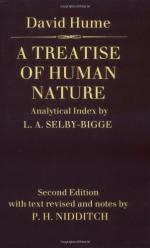
|
| Name: _________________________ | Period: ___________________ |
This test consists of 5 multiple choice questions, 5 short answer questions, and 10 short essay questions.
Multiple Choice Questions
1. What is Hume's general goal in his treatise?
(a) To explain morality.
(b) To explain the similarities between love and hate.
(c) To explain the origins of ideas and impressions.
(d) To explain the origins of vice and virtue.
2. What is the title of Book Three, Part Two?
(a) Of Religion and Atheism.
(b) Of Love and Hate.
(c) Of Justice and Injustice.
(d) Of Morals and Immorals.
3. Of what does Hume say we have a false sensation?
(a) Caused choice.
(b) Underlying emotion.
(c) Sub-emotion.
(d) Uncaused choice.
4. What best describes Hume's conception of the will?
(a) An extrinsic force.
(b) An intrinsic force.
(c) A power.
(d) A feeling.
5. Which virtues does Hume say are instinctual?
(a) Internal virtues.
(b) Natural virtues.
(c) External virtues.
(d) Artificial virtues.
Short Answer Questions
1. Who does Hume say must be bound to family in order for it to work?
2. What does religion argue about free will?
3. What was required to regulate society once it had evolved into a certain order?
4. What does Hume say determines the will?
5. What does Hume say justice must be to motivate us?
Short Essay Questions
1. Summarize Book Two.
2. What does Hume mean when he says one cannot derive an ought from an is?
3. Why does Hume want to answer the question, "Which impression or ideas help us to divide virtue from vice?"
4. How does Hume define artificial virtues?
5. What is Hume's argument against those who defend free will?
6. Why does Hume think passions rather than reason determine the will?
7. How has society developed a sense of justice?
8. Why does Hume reject all other moral theories?
9. Why does Hume claim women need a sentiment of chastity?
10. Why does Hume say common loyalty is so important?
|
This section contains 692 words (approx. 3 pages at 300 words per page) |

|




